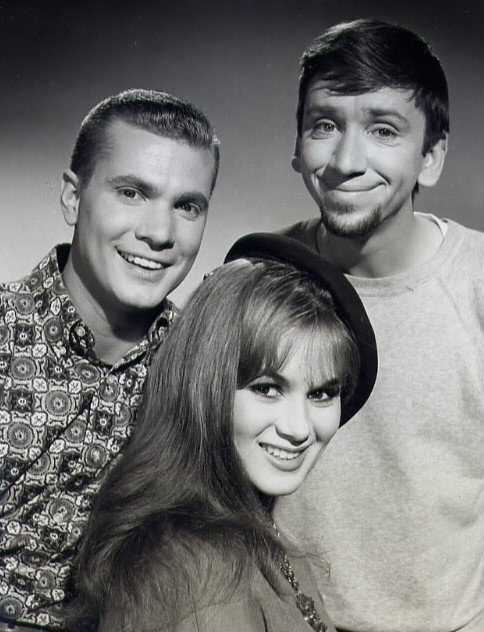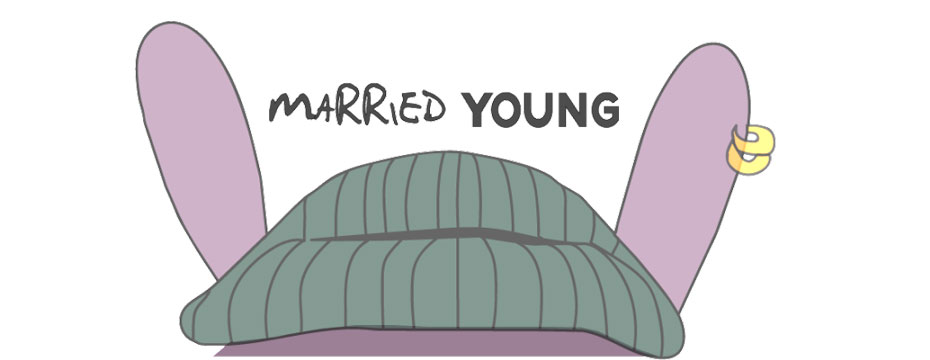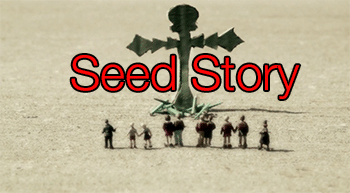
Breaking the Fourth Wall
Have you ever seen a TV or stage set of a room? Have you been to a live play? There are usually 3 walls – the back wall and 2 side walls. The fourth wall is presumed to be there, but it’s invisible – it what the audience is watching the play or TV show “through”. Any time a character turns to the camera, addresses the audience, or makes a comment that makes it seem like he KNOWS he’s in a TV show or a play, he’s said to be “breaking the fourth wall” – the wall that separates him from the audience. As a technique, breaking the fourth wall is rarely employed, as it makes the performance appear artificial, not the fantasy story of the director’s vision. In The Dobie Gillis Show, breaking the fourth wall was a powerful technique to draw the audience closer to the Dobie Gillis character by reaching through the invisible fourth wall and bringing you into the room with him.
The Many Loves of Dobie Gillis
The Many Loves of Dobie Gillis (also known as simply Dobie Gillis or Max Shulman’s Dobie Gillis in later seasons and in syndication) is an American sitcom that aired on CBS from 1959 to 1963. The series and several episode scripts were adapted from a 1951 collection of short stories of the same name, written by Max Shulman, who had also written a feature film adaptation of his short stories for MGM in 1953, The Affairs of Dobie Gillis.
The series revolved around the life of teenager/young adult Dobie Gillis (Dwayne Hickman), who, along with his best friend, beatnik Maynard G. Krebs (Bob Denver), struggles against the forces of his life – high school, the military, college, and his parents (Frank Faylen and Florida Friebus) – as he aspires to attain both wealth and dates with girls. The Many Loves of Dobie Gillis was produced by Martin Manulis Productionsin association with 20th Century Fox Television. Creator Shulman also wrote the theme song in collaboration with Lionel Newman.

Dobie Gillis (Dwayne Hickman, left), Maynard G. Krebs (Bob Denver, right) and one of Dobie’s “many loves”, Yvette LeBlanc (Danielle De Metz), in a still from the Dobie Gillis episode “Parlez-Vous English”, originally aired December 27, 1960.
Want more examples? Here is eight and a half minutes of breaking the fourth wall, a compilation from artist Leigh Singer using films for source media Unlike television, breaking the fourth wall is a technique used far more often in theatre and films.
Breaking the 4th Wall Movie Supercut from Leigh Singer on Vimeo.
A montage compilation of scenes and moments from films that all “break the fourth wall” – that is, acknowledge (usually directly to the camera, and therefore the audience) that they’re part of a movie.
The montage includes 54 different films (some used more than once) from perhaps the very first example of breaking the fourth wall right up to today. There were so many other great examples I couldn’t find room for (sadly, The Dude and The Big Lebowski’s narrator don’t abide here), I’d love to hear which 4th wall breakers you’d also include. Look forward to hearing your comments!
The list of 54 films featured, in order: The Player (1992), Blazing Saddles (1974), The Great Train Robbery (1902), Persona (1966), Alfie (1966), Ferris Bueller’s Day Off (1986), Richard III (1995), Richard III (1955), Sunset Blvd. (1950), Fight Club (1999), Kiss Kiss Bang Bang (2005), Le Mepris (1963), High Fidelity (2000), Spaceballs (1987), Hot Tub Time Machine (2010), The Hudsucker Proxy (1994), Jay and Silent Bob Strike Back (2001), Horse Feathers (1932), Annie Hall (1977), A Matter of Life and Death (1946), Amelie (2001), On Her Majesty’s Secret Service (1969), Death Proof (2007), Austin Powers: The Spy Who Shagged Me (1999), The Meaning of Life (1983), Road to Bali (1952), The Rocky Horror Picture Show (1975), Animal House (1978), The Omen (1976), The Devil’s Advocate (1997), Psycho (1960), Orlando (1992), Young Frankenstein (1974), Do the Right Thing (1989), Gangster No.1 (2000), A Bout de Souffle (1960), A Clockwork Orange (1971), Top Secret! (1984), Family Plot (1976), Superman – The Movie (1978), Bronson (2008), Airplane! (1980), Funny Games (1997), Funny Games (2007), The Great Dictator (1940), Lord of War (2005), JFK (1991), Goodfellas (1990), Y Tu Mama Tambien (2001), The Nutty Professor (1996), Tom Jones (1963), Monty Python & The Holy Grail (1975), The Holy Mountain (1973), Who Framed Roger Rabbit (1988).
PLEASE RATE THIS STORY! [ratings]







